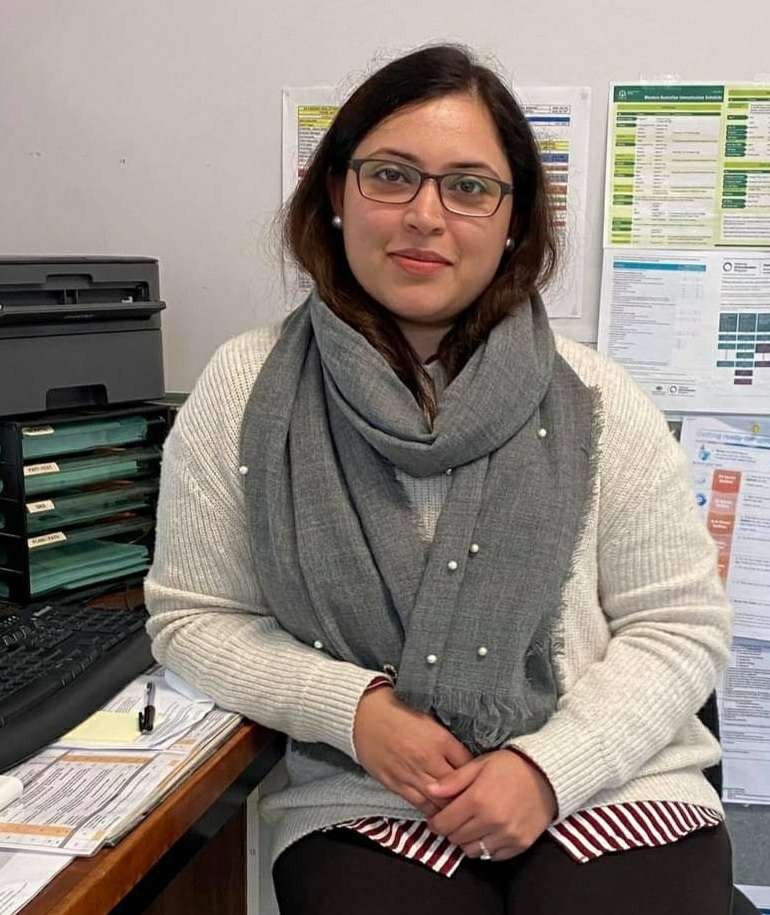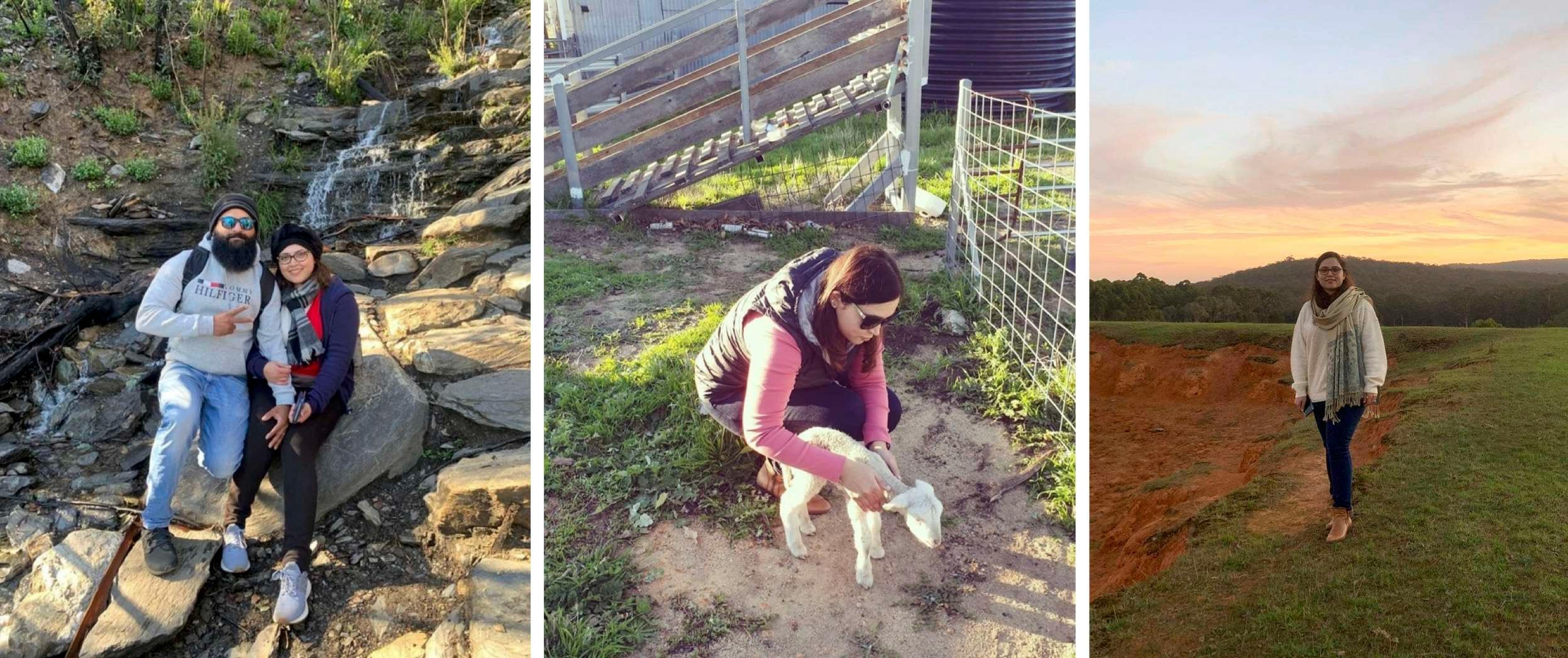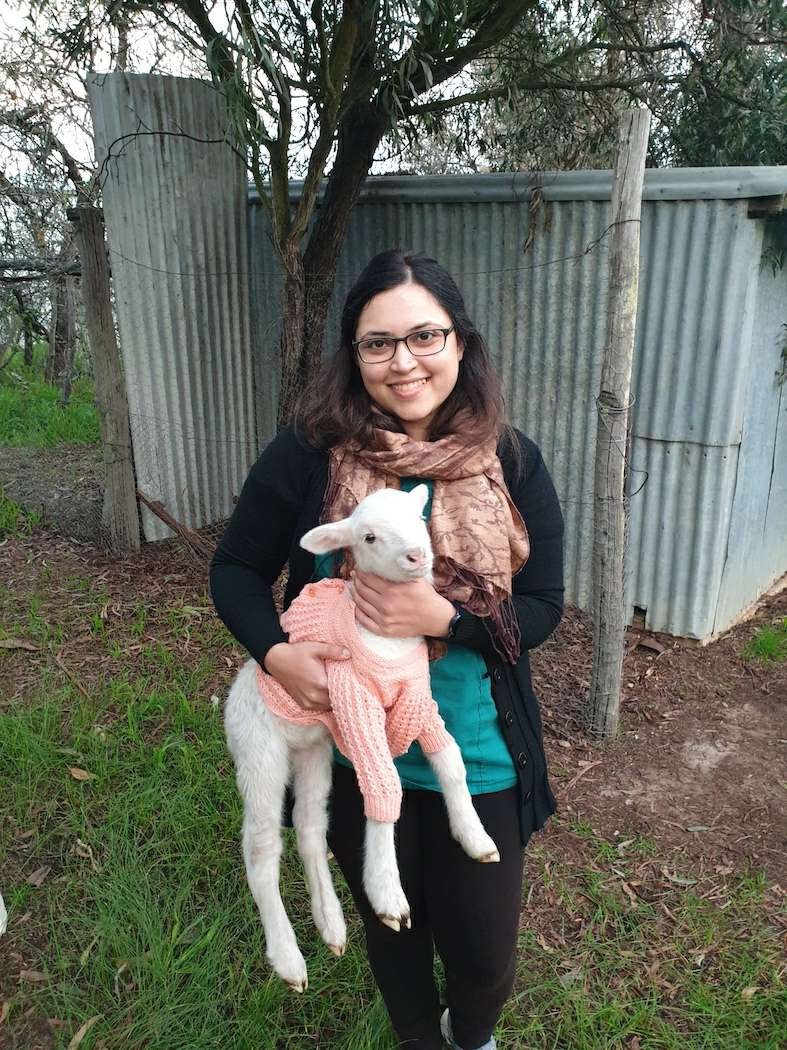Born and raised in Pakistan’s largest city, Karachi (population over 20 million), Dr Emmon Mubbashir’s upbringing was far from rural – but since 2019 she has been enjoying working as a GP registrar in Katanning, in the Great Southern region of Western Australia, while training with RVTS towards her RACGP Fellowship. She’s endeared herself so much to the locals that one farmer brought her a rather special gift a few years ago.
Emmon was appointed as one of RVTS’s Registrar Liaison Officers (RLOs) in January 2022, helping to provide an important connection between the RVTS management team and the wider RVTS family.

Were you always going to be a doctor…what would you have been otherwise?
Yes, always a doctor [laughs]. One of my earliest childhood drawings is of a building that five year old me named ‘Emmon’s Hospital’ – my mum probably still has it safely kept somewhere!
What got you interested in medicine as a career –
and then Rural Medicine?
I didn’t think I would do anything apart from medicine. Rural Medicine wasn’t my first choice, to be honest, but things have worked out well and I am content with how life is now.
I like that every patient is different – the variety keeps me very engaged. In just one hour today, I saw a complex alcohol-dependent person finally recovering, followed by a neonatal check for a very premature baby. Then I prepared a medico-legal report to the Department of Transport for a person who drives commercially, and after that helped a farmer with ways to navigate the emotional and mental stress of succession planning.
What direction has your medical career taken since graduating?
My career has taken a very different turn than I had expected. I aspired to be a neurologist from Year 2 of medical school. I guess life happened and I eventually got into rural general practice in late 2019. The occasional Multiple Sclerosis that I see still sparks my interest in neurology!
What is your practice mix in Katanning?
I am the only female GP in town – that attracts a lot of women’s and child health presentations. And then I see the husbands and parents from a lot of ‘word of mouth’ referrals. I also see a lot of elderly people and refugees, and lately have been seeing quite a few young people. I feel privileged that young people trust me enough to see me on their own for various issues.
What challenges have you faced in your own GP training journey?
I guess the main challenges which will resonate with a lot of my fellow registrars are those we face as IMGs. The struggles start from Australian Medical Council exams, landing a job, relocations, finding training opportunities etc. Having a supportive spouse certainly makes it all possible – I just passed all my Fellowship exams thanks to my husband Syed’s support.
Syed is the telecommunications guy for our Southwest WA region, which is what has kept our little family continuing to serve the local community. He fixes their internet and I try to fix their health issues!
What have been the highlights of your practice work so far?
Every patient interaction can be a lesson in itself if one wants to look at it that way. Doctors are very privileged to know so much about the people we meet. The most important lesson I have learnt as a small town GP has been a non-medical one. It has been about professional boundaries – with a small population where everyone knows everyone, to maintain confidentiality is of utmost importance.
Any amusing or memorable experiences you’ve had so far as a doctor?
In early 2020, a farmer patient gifted me an orphaned one-week-old lamb to hand raise on our farm, after I’d mentioned how much I would love to do that. Country doctors really do enjoy the best Australian produce in all shapes and forms, and in this case Raju the lamb was a (very) active example!
How did you become involved with RVTS?
To be honest, the credit goes to my practice manager. She recommended that I apply, as I was new then and didn’t really know much outside AGPT.
What got you interested in becoming an RLO?
I was on maternity leave when the role was advertised. Syed thought I could easily take up another role outside of being a first time mum, so I applied. Ronda [RVTS Director of Training] and Pat [RVTS CEO] seemed to concur following my interview! [Laughs] My daughter, Sakina, is now 19 months old. Pretty much everyone at RVTS met her and Syed at our Sydney and Brisbane workshops this year!

What are some of the key issues raised with you in your role as an RLO?
Several so far. I’m not sure if I have been able to affect any changes but I have certainly helped to brainstorm how to improve things for future registrars. Some of the issues I have provided suggestions on have been:
- more support for registrars who are also mums with young kids
- more hands-on practical skills workshops, given pandemic restrictions meant current cohorts missed out on some face-to-face workshops during their training
- a potential expansion of RVTS’s role to provide prevocational training for IMGs, in order to help strengthen the medical workforce in rural and remote communities
- increased engagement with RVTS cultural mentors to help better understand and look after the health of our First Nations people (especially for those doctors training via our Remote stream)
- creation of Balint-like debriefing sessions online or during workshops, where registrars from all over the country come together to help each other with morally/emotionally complex clinical interactions
- more education around MBS billing procedures and contracts, in order to safeguard registrars
What have you found is the most successful way to engage with our registrars in order to hear their stories and challenges on their RVTS journey?
The best way has been actually meeting people in the face-to-face workshops following the easing of COVID restrictions, sharing how all of us are facing the same challenges and how one person’s experiences can help another.
What have you taken away personally as an RLO – how has undertaking the role been of benefit to your own registrar journey?
It has been so much fun being an RLO – being able to meet Pat and Ronda to discuss issues as they come up, and advocating for fellow registrars in order to hopefully affect change and continuously improve the RVTS experience.
Future plans for your medical career?
I definitely want to move into academia and teach medicine while still continuing to work in clinical practice. A future Medical Educator for RVTS perhaps!
What would you say to someone who is considering RVTS for their training journey?
I would recommend RVTS 100% – its strength lies in its relatively small numbers. Everyone knows everyone and you really get one-on-one attention to individualise your training path.
Interests outside medicine?
I love to cook. I like to create recipes and experiment with spices and flavours. I have a public Instagram page called a ‘abitofacook’ if anyone wants to check it out – shameless self-promotion! [Laughs] I am also working on writing a book – which may or may not see the light of the day! It’s about lessons I have learnt from certain patient interactions that have helped me grow as a person. I started working on it in med school and will probably keep adding to it for as long as I work in clinical practice – a career as a doctor is a lifelong learning process!





